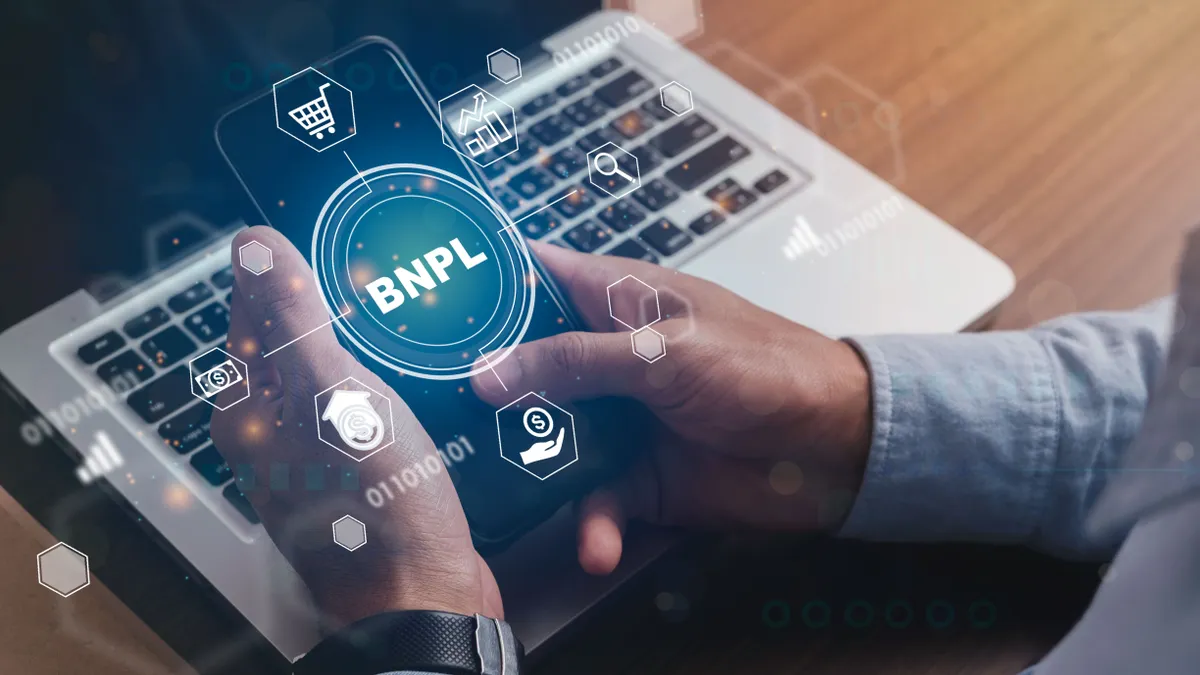Expect buy now, pay later to be a juggernaut in payments for years to come.
That's according to the 156-page 2022 Global Payments Report released March 2 by the Worldpay unit of Fidelity National Information Services, also known as FIS. Buy now, pay later will account for about $438 billion, or 5.3%, of the global e-commerce transaction value by 2025, up from 2.9%, or $157 billion, in 2021, fueled by strong demand in key markets such as North America and Europe.
BNPL transactions accounted for 3.8% of the value of North American e-commerce sales in 2021, compared with 1.6% a year earlier, according to the report. In Europe, BNPL accounted for 8.1% of the continent's e-commerce transaction value, per the report from Jacksonville, Florida-based FIS.
The value of U.S. e-commerce transactions rose 10% between 2020 and 2021, while Canada showed a 13% gain during that same time. FIS estimated North American e-commerce transactions value will grow at an average 11% compound annual growth rate through 2025, when it will reach $2.3 trillion.
"Dozens of BNPL firms compete in the U.S. market that is projected to represent upwards of 9% share (nearly US$180 billion) by 2025, including Affirm, Afterpay, Klarna, PayPal Credit, Sezzle and Zip," the report said. "Europe continues to lead in the use of BNPL at the point-of-sale, accounting for 1.9 percent of in-store payments in 2021."
FIS expects BNPL to be the fastest-growing e-commerce payment method through 2025 in the U.S. and Canada as well as in Brazil, Hong Kong, India, and the U.K., among other markets.
Concerns linger about BNPL's surging popularity. Consumer Financial Protection Bureau Director Rohit Chopra on Dec. 16 issued a series of orders to Affirm, Afterpay, Klarna, PayPal and Zip, requiring those BNPL firms to provide information about their business practices.
The CFPB pressed BNPL providers for details on whether operators have followed consumer protection laws. The agency also asked about data harvesting conducted by providers, some of which have created shopping apps with partner merchants. Chopra also raised concerns about the level of debt consumers are taking on in BNPL transactions.
Affirm and Klarna said they met a March 1 deadline set by the CFPB to comply with the order. The other companies targeted by the bureau haven't publicly indicate last week whether they handed in their paperwork late.
Some consumer activists including the Center for Responsible Lending have also raised concerns about BNPL services, which are popular with young consumers. In addition, a group of six Democratic senators urged the CFPB in December to investigate the industry.
Consumers took to BNPL and other services like digital wallets during the COVID-19 pandemic, and show no signs of abandoning them, the report said. The FIS forecast predicted digital wallets will account for around one-third of North American e-commerce spending by 2025.
"Even as more customers return to the store, it is clear that there is no going back on the innovations we are seeing within fintech," Jim Johnson, head of merchant solutions at FIS, said in a press release.
"Consumers are now mirroring the way they shop online while they are at their favorite retailer – creating a more advanced blend of digital and physical payment options than we saw prior to the pandemic. The implications of this are significant for merchants, who now need to innovate and partner with a technology provider who can help them meet the diverse needs of modern-day consumers," Johnson said, per the release.
















